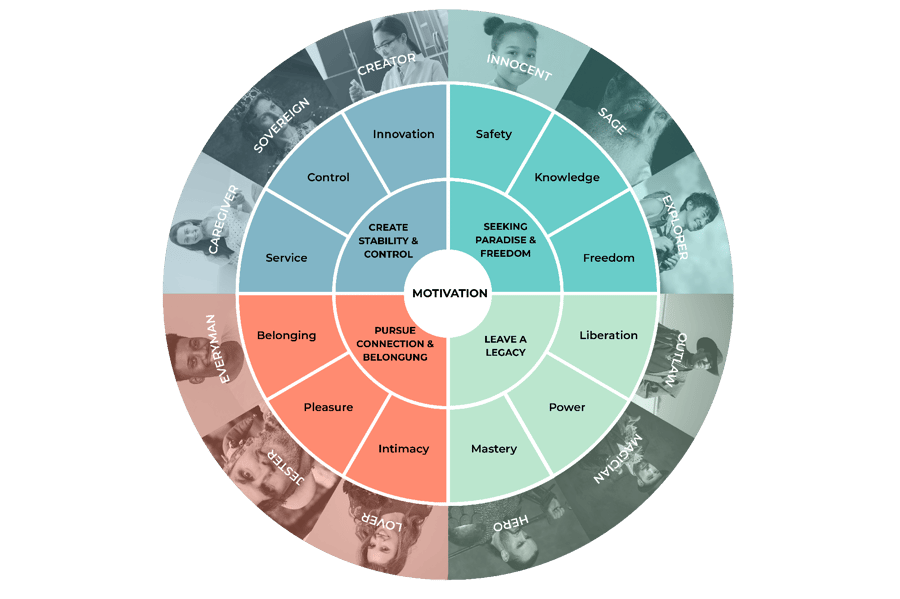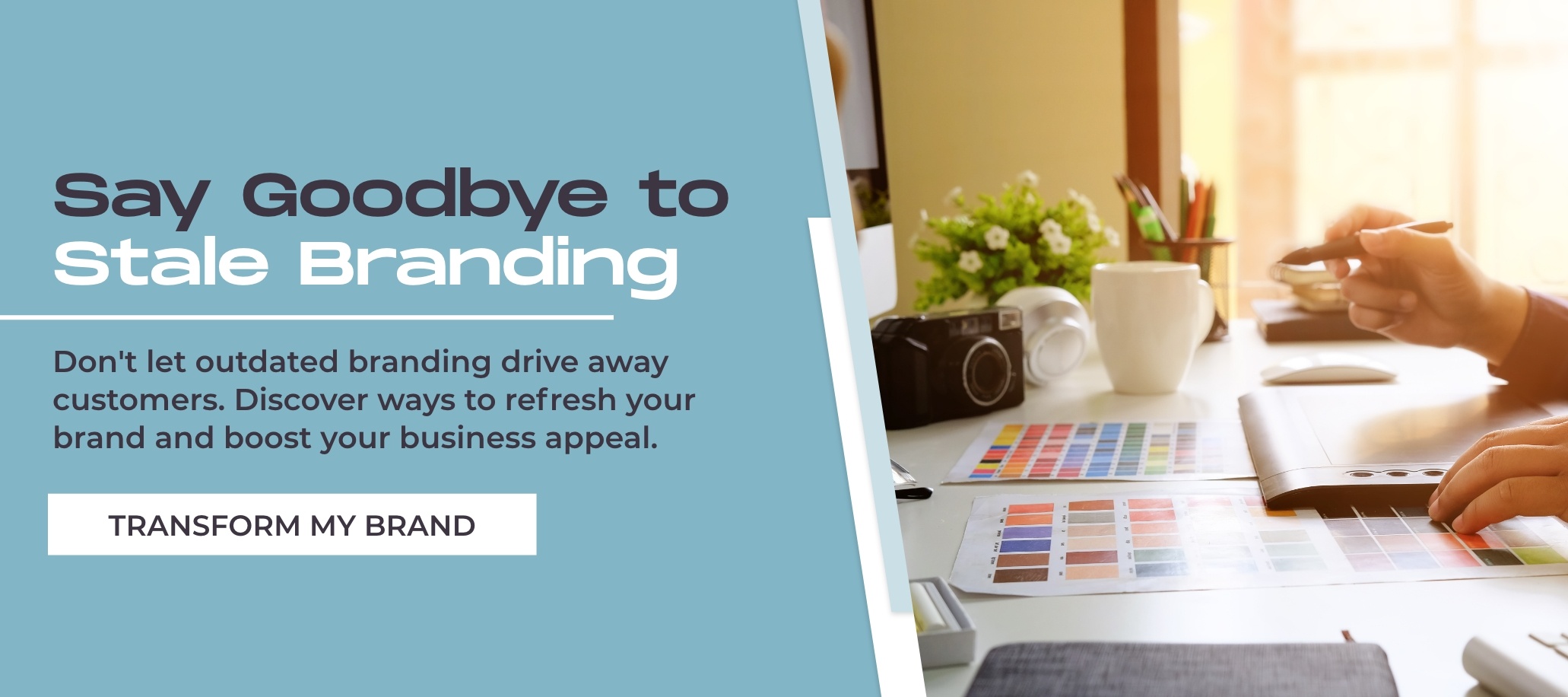Brands must connect with their audiences to build trust, generate demand, and turn customers’ interest in the product or service into tangible revenue and growth. But there's no one right way to relate to your audience. If there were, brand differentiation — and B2B branding in general — wouldn't be such an important topic.
Why You Need to Know Your Brand Archetype
Humans try to personify everything. So, whether you like it or not, customers will see you as one of 12 brand archetypes — and sometimes not the best version of it.
Which archetype is your business? Take the quiz.
Owning an archetype is a lot like claiming your business profile on Google. If you don't, you don't have any control over the narrative others create for you — a sure sign of a weak brand.
Brand archetypes help you:
- Define your brand personality
- Find your voice
- Consistently relate to customers
While we often focus on the buyer persona in inbound marketing, understanding and developing a consistent brand image is just as important as knowing who your customers are. Embracing and consistently communicating as one of these 12 personalities is how to grow your business with marketing.
12 Brand Archetypes and the Brands You Know That Use Them
1. The Creator
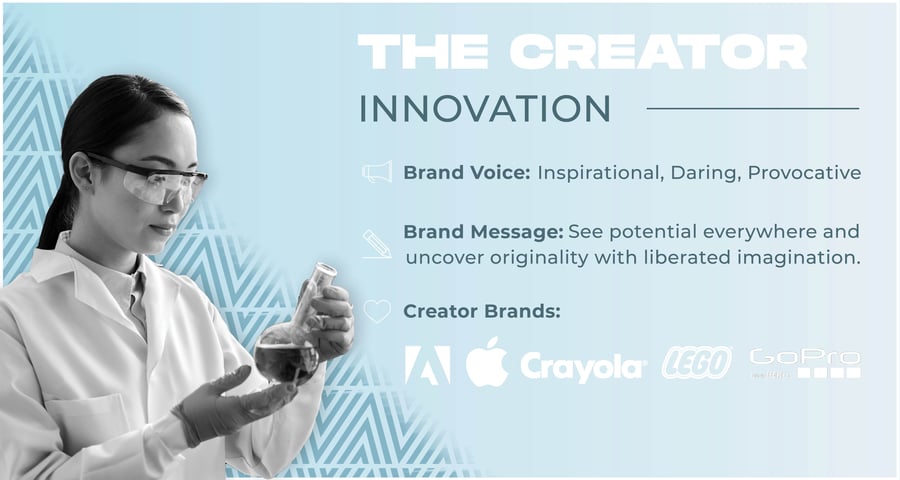
The Creator sees the world as a place full of possibilities. They are inspiring, have a vision, and know how to shape the world around them to match it.
They're driven, inventive, original (maybe a little quirky), and don't color in the lines that the "industry" has established for them. They want to be the first to innovate and are always looking for the next big thing. They might be a dreamer, but they're also a doer; they make their own rules, but they follow them.
Creator Brand Archetypes: Lego, Apple, Adobe, GoPro, Pinterest, YouTube, Sony, Tesla, Crayola
2. The Caregiver
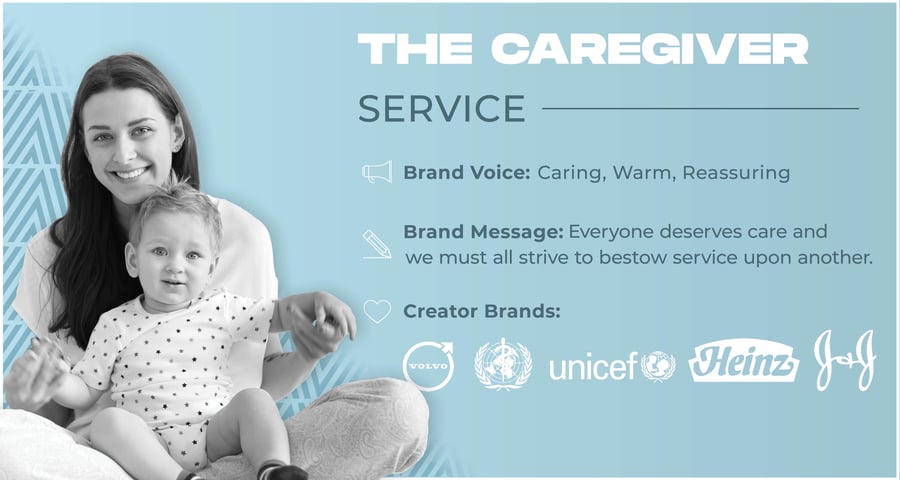
Caregiver brands let compassion rule every decision and honestly want to help others. They believe that it takes a village and that we must look out for people who are less fortunate than we are.
Caregiver brands often exist in the non-profit sector and in nursing and healthcare in general. They may also position themselves as caring for the people who care for others.
Caregiver Brand Archetypes: Unicef, Johnson & Johnson, NHS, Pampers, Volvo, Heinz, World Health Organization (WHO)
3. The Sovereign
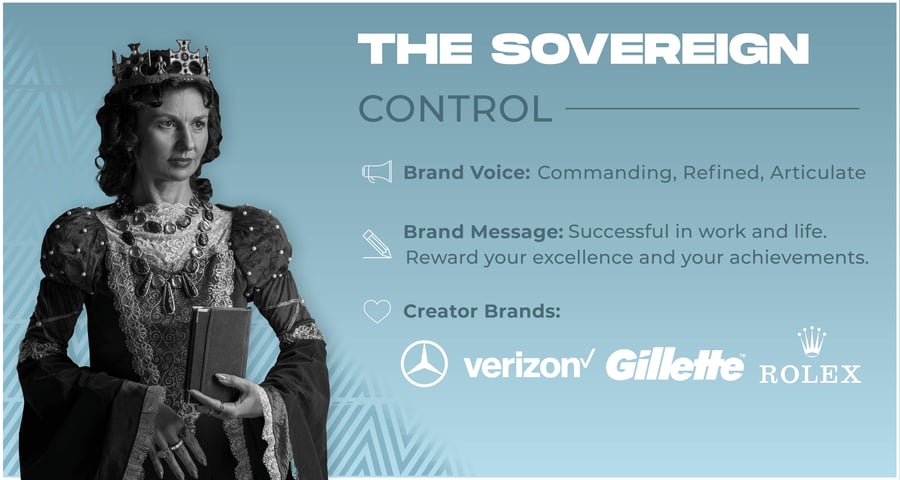
The Sovereign values power and control above all else. They think rules are made to be followed — without question. They're confident because they know that what they're doing works. They have the analytical data to back it up.
They have staying power and have been the trusted choice for decades. If you follow them, you can be successful too.
Sovereign Brand Archetypes: Microsoft, Rolls-Royce, Rolex, Hugo Boss, American Express, Bassett Furniture, Mercedes, Gillette, Verizon
The Creator, the Caregiver, and the Sovereign communicate to customers with one central motivation: to create stability and shape the world they want. That said, each archetype seeks to meet this goal in a slightly different way.
4. The Magician
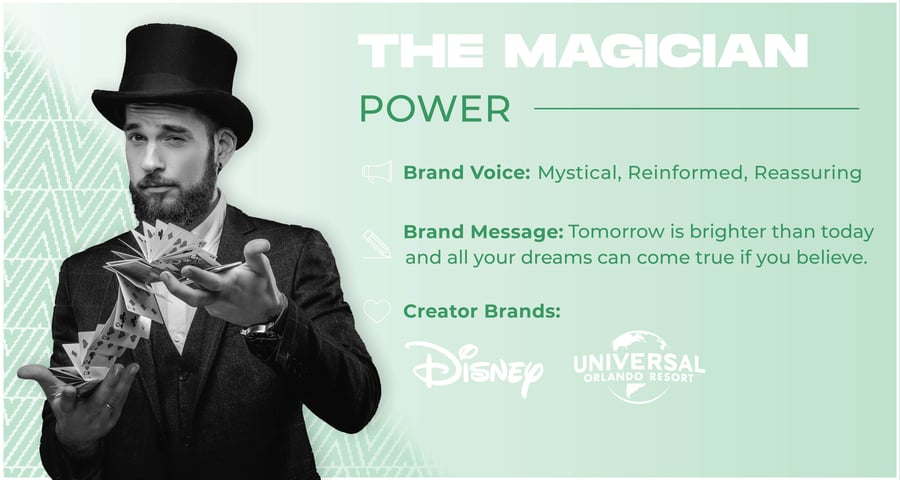
Magicians delight and dazzle. They offer exciting and transformative experiences that are designed to create lifelong memories. They may offer an escape from reality — time to relax, rejuvenate, and restore.
Magicians love knowledge but use it to make the vision they want a reality. They want others to join them.
Magician brands strive to make dreams come true. If you are already thinking of Disney, you'd be on point.
Magician Brand Archetypes: Walt Disney, TEDX, MAC Cosmetics, Dyson, Red Bull, Snickers, Polaroid
5. The Hero
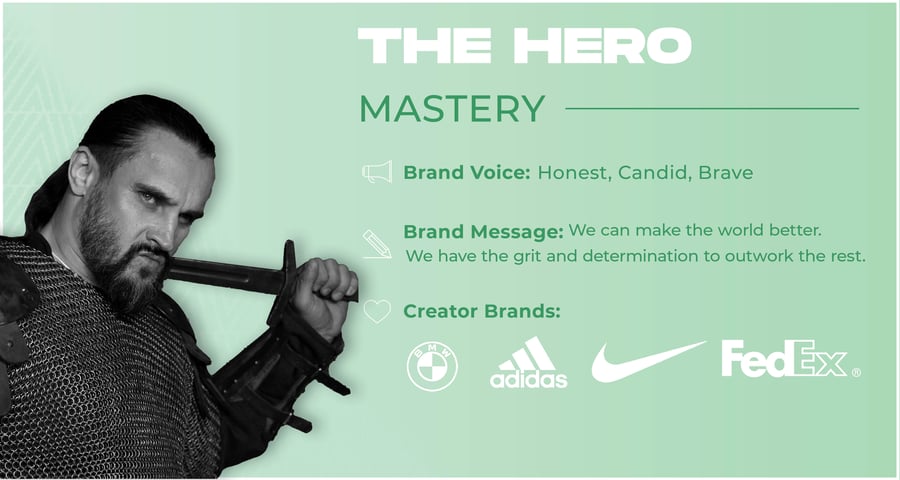
The Hero is virtue-driven. They believe in right and wrong and fight to overcome injustice and obstacles holding people back from reaching their true potential. They're proud of how they've helped others and see the work they do for others as the most essential thing in the world.
The Hero is an inspirational brand that motivates and empowers its customers to succeed and achieve.
Hero Brand Archetypes: Nike, BMW, FedEx, Adidas, The Royal Marines, Marvel, Gatorade, Amazon
6. The Outlaw
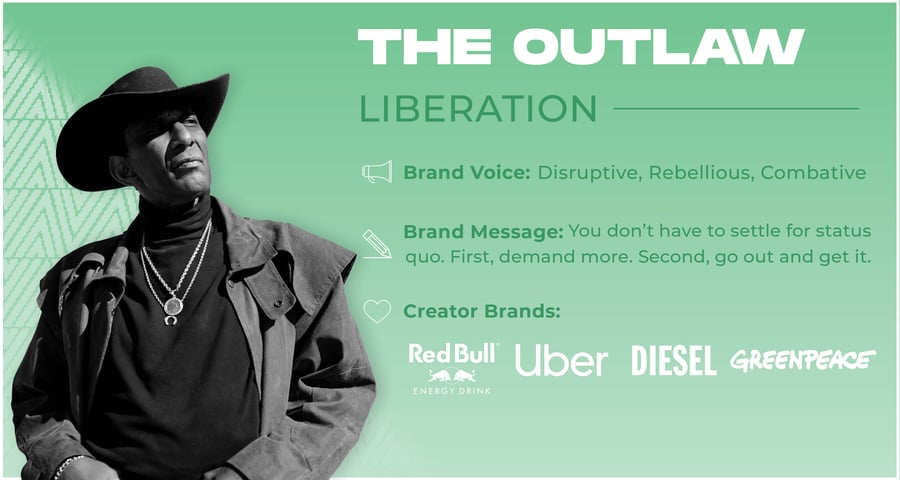
The Outlaw turns the status quo on its head. They're active rulebreakers who think outside the box. They have a cult following and generate strong brand loyalty within a niche.
That said, they're not afraid of alienating people who are too conforming, so they may not have broader appeal. But that's why their brand advocates love them.
Outlaw Brand Archetypes: Red Bull, Harley-Davidson, Uber, Diesel, Greenpeace
The Magician, the Hero, and the Outlaw connect with an audience that wants to leave a legacy.
7. The Sage
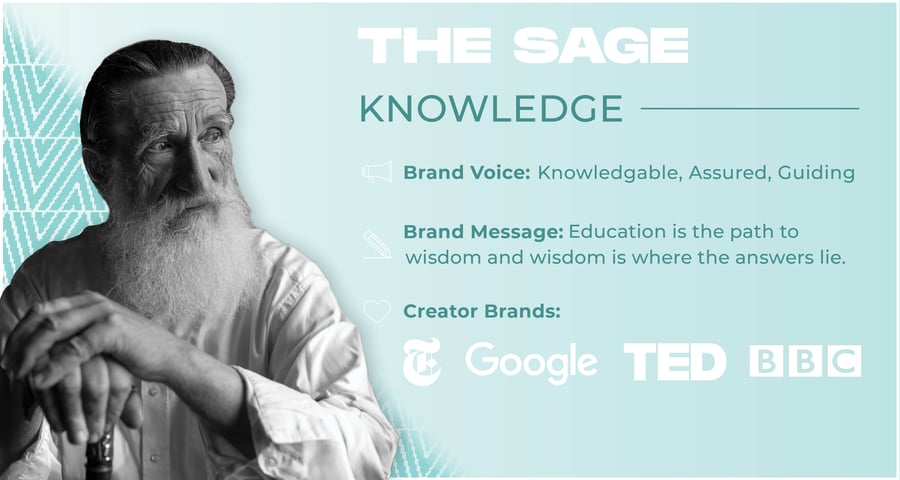
The Sage values knowledge, wisdom, and the truth — even when it's hard to hear.
At their best, they come off as humble. They're not trying to shake things up or tell someone they're always right.
Instead, the Sage wants to be a valuable resource that empowers others to make their own decisions and use what the Sage shares in their own way — taking what they need right now and leaving the rest for others.
Sage Brand Archetypes: Google, TED, BBC, The Times, Discovery Channel, The Economist, Motley Fool
8. The Explorer
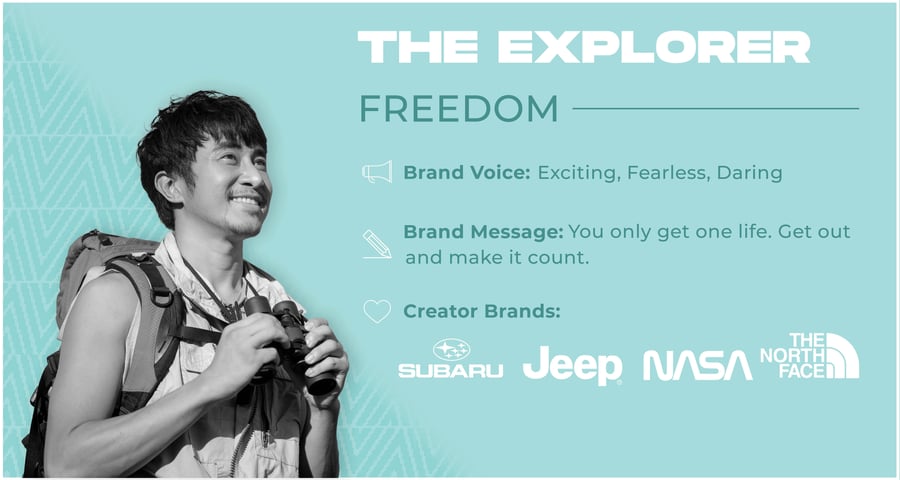
The Explorer loves the open road and going wherever the day takes them. They're not trying to disrupt the industry. But they believe people should be open to new experiences. They're willing to go where others won't go, and they want you to come along for the ride.
Explorer Brand Archetypes: Jeep, NASA, The North Face, Subaru, National Geographic, Patagonia, The Body Shop
9. The Innocent
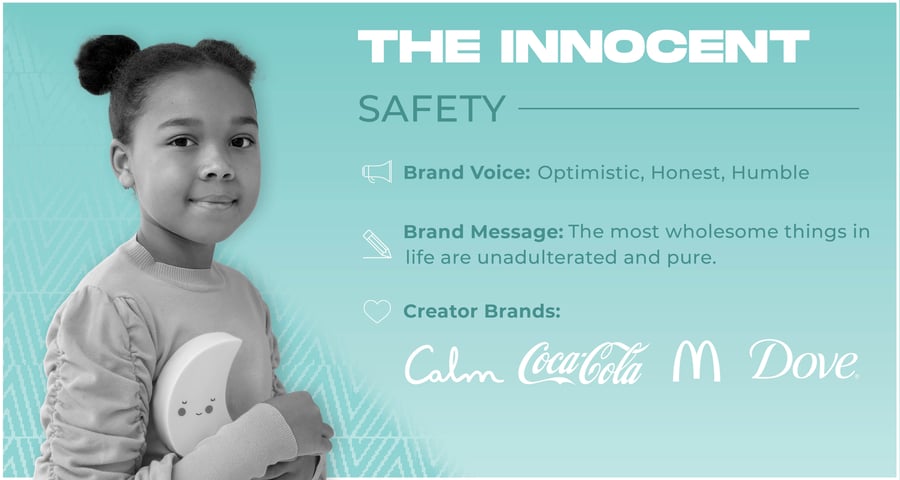
The Innocent brand archetypes reject realism in favor of seeing the world as they want it to be. They are open and see the beauty in the simple things. They can find joy and contentment amid stress or strife.
The Innocent knows the world isn't perfect, but chooses to focus on things that make them happy most of the time.
Innocent Brand Archetypes: Coca-Cola, Dove, McDonald's, Volkswagen, Calm App
The Sage, the Explorer, and the Innocent relate to an audience seeking paradise and freedom.
10. The Lover
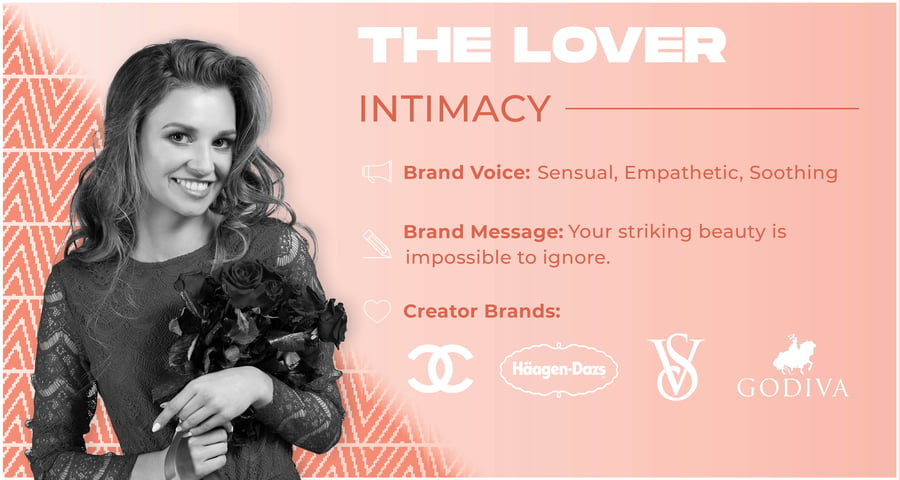
The Lover is motivated by desire and seeks closeness with its audience. It uses sensual language to make an emotional or visceral connection.
Lover brands aren't necessarily your Victoria's Secret types. Many spiritual, friendly, and family-oriented brands take this approach because love and passion can take many forms depending on the relationship.
Lover Brand Archetypes: Victoria’s Secret, Häagen-Dazs, Godiva, Chanel, Ann Summers, Gucci, Thorntons, Baileys, Magnum, NESCAFÉ
11. The Jester
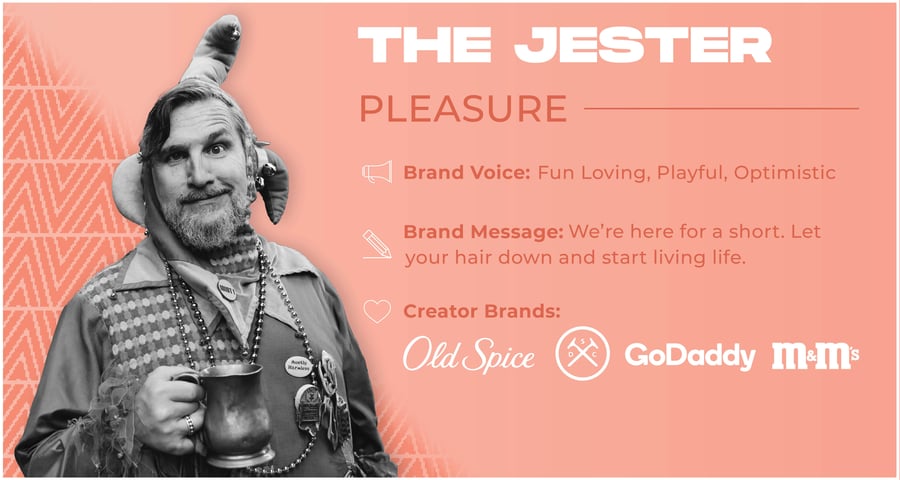
The Jester lives to make people laugh and can find humor in any situation — even when they shouldn't go there. They're optimists; even when it's time to get serious, they find a playful way to communicate their ideas.
Jesters steer away boredom by living in the moment. They are always young at heart and quick-witted.
Jester Brand Archetypes: GoDaddy, Budweiser, Doritos, Skittles, Old Spice, M&Ms, Dollar Shave Club, Pepsi
12. The Everyman
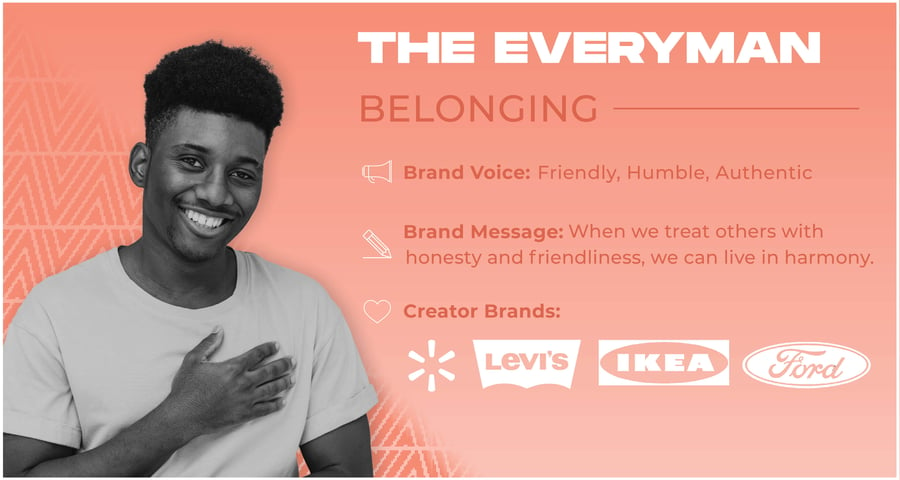
The Everyman, sometimes called the Citizen, doesn't try to be anything special. They're friendly and approachable. They believe in treating others like they want to be treated and creating a sense of community where everyone feels welcome.
They understand people and know what their audience wants but still have mass appeal. They provide no-nonsense solutions to common problems.
The Everyman connects with a particular audience. But they're sometimes forgettable. In fact, you may not be able to think of an Everyman brand even though you use their products every day.
Everyman Brand Archetypes: Home Depot, Tesco, Ford, Levi's, Ikea, Walmart, Toyota, eBay, Old Navy, TUMS, Stanley, Crockpot
The Jester, Everyman, and Lover each speak to the customer's need to connect on a meaningful level. But again, they have their own way of going about it.
Get the eBook that details each brand archetype to find your fit: 
Choosing an Archetype for Your Business
Keep in mind that once you choose an archetype, you have to commit. You'll be leaning into a certain voice, and once you do that, rebranding is hard.
Once customers see you one way, they see everything you do through that lens. With that said, it's always better to be a “somebody” rather than a “nobody” — especially in business.
When choosing your brand archetype, first consider what comes naturally to you. You may want to be a Jester. But can you be funny? How about the Explorer? But do you always play it safe?
People hate inauthentic brands — and this isn't that "good" kind of hate when loyal customers rally around you. They reject you.
Try different archetypes on paper. Think of ways your brand can subtly communicate your archetype so that people get it without you having to say it. Brainstorm the images, places, people, colors, and things that embody that branding.
Remember: The right archetype for your brand won't feel forced.
What personality traits do your customers value? If you're a B2B finance technology brand, the Jester or the Innocent could make a bad impression.
Consider how customers currently interact with you and how leaning into a personality will impact those relationships.
How to Build a Brand Personality
Once you've found a brand archetype (or perhaps two) that feels right, it's time to take three critical steps before you jump into this new brand personality.
1. Create a Slogan
A slogan makes a strong statement about who you are in the fewest words possible. Your slogan should align with your archetype. So, if you're Innocent, it should embody innocence. If you're going to be a Rebel, the slogan should sound rebellious.
2. Align Your Messaging
People instinctively get archetypes even if they have no idea what one is. So, regardless of where your B2B marketing strategy dictates that your brand appears — LinkedIn, Facebook, email, etc. — it’s important that you consistently communicate that this is who your brand is.
3. Adjust Your Website
Your website must reflect your brand personality. Every marketing message, ad, post, and strategy leads people here. You don't want people to think they know you from Facebook and then get to your site for a "what is this?" moment.
A Creator needs to have a website that communicates bold creativity. But a Ruler's website would follow well-established and traditional design features. The Innocent brand might use a light color palette and whimsical imagery.
The Importance of Building an Emotive Brand
When LAIRE re-branded, we discussed what being a Creator and Explorer (our chosen archetypes) means to us. We described this personality not just in words but in imagery and the things, people, colors, brands, animals, and places that embody it.
Next, we began building design and voice concepts to include in our brand guide to define how we communicate this message with our customers. Companies that want to build a robust and memorable brand will undergo a similar branding process.
Clearly, developing an enduring and unforgettable brand is a lot to think about. But it's essential to get it right because once you let your brand archetype out of the bag — for better or worse — there's no going back.
You must have an emotive brand to grow your business through marketing.
Not to mention, the alternative is stagnation. Without a vibrant personality, people can buy your products, but they won’t feel a strong connection to your brand. This means that if something better comes along, your customers could walk out the door.
Time to Build a Memorable Brand
LAIRE is a creative branding agency that helps B2B companies like yours discover who you are, find your voice, and help your ideal customers find and get to know you, too.
How do people see your brand? And is your current image what's holding you back? Take our brand assessment to find out now:

